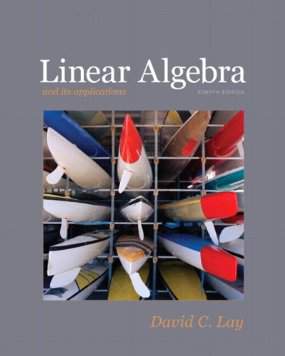Connecting...

This is a quick preview of the lesson. For full access, please Log In or Sign up.
For more information, please see full course syllabus of Linear Algebra
For more information, please see full course syllabus of Linear Algebra
Linear Algebra Similar Matrices & Diagonalization
Lecture Description
Here we’ll take our knowledge of eigenvalues and apply it to finding a similar matrix. The formula will be shown in the video. The things to note here are that given any matrix, you can find a matrix that’s similar to it after calculating the eigenvalues, which will in turn give you the matrix P. This idea of a similar matrix gives way to the idea diagonalization of a matrix, which is the important topic in this section of linear algebra. After getting a good grasp on diagonalization, head on over to the next video where we’ll close up the topic of eigenvalues.
Bookmark & Share
Embed
Share this knowledge with your friends!
Copy & Paste this embed code into your website’s HTML
Please ensure that your website editor is in text mode when you paste the code.(In Wordpress, the mode button is on the top right corner.)
×
Since this lesson is not free, only the preview will appear on your website.
- - Allow users to view the embedded video in full-size.
Next Lecture
Previous Lecture










































 Answer Engine
Answer Engine




2 answers
Last reply by: Hen McGibbons
Sun Apr 24, 2016 5:54 PM
Post by Ahmed Alzayer on September 28, 2015
I have B 2x2 matrix =
Cos x -Sin x
Sin x. Cos x
It still can be diagonalized even though the roots are imaginary, can u clarify.
1 answer
Wed Nov 13, 2013 3:05 AM
Post by Eddie Chan on November 12, 2013
Hi Raffi,
I received a question about "If A and B are diagonalisable n x n matrix, so is A + B." I have no idea how to prove or disprove it.
0 answers
Post by Manfred Berger on June 23, 2013
In Theorem 2 I get why the multiplicity of the eigenvalues impacts whether or not a matrix is diagonalizable, but why does it matter that the values are real. If the characteristic polynomial has complex roots P has complex entries. Somehow I don't see why that changes anything
0 answers
Post by Manfred Berger on June 23, 2013
Could 2 eigenvectors of an n*n matrix ever be linearly dependent?
1 answer
Last reply by: Carlo Lam
Tue Apr 30, 2013 12:54 AM
Post by Carlo Lam on April 30, 2013
P is always an arbitrary matrix?
0 answers
Post by Matt C on April 27, 2013
I guess I don't understand what you are saying for example 4 at 20:18 when you say this is only one vector. When I plugged in all the values for lambda, I got three eigenvectors [[1,0,0], [0,1,0], [0,1,0]]. If there is a way where you could explain it would be nice. I was feeling pretty good up until this point with eigenvalues, eigenvectors, and diagonalization.